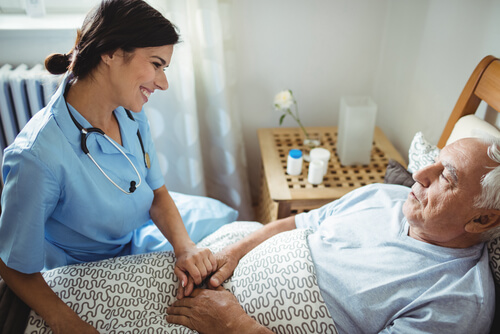
Page contents
- Palliative care at home
- What palliative care can you receive at home?
- Palliative care options
- Hospice care
- Home visits
- Live-in care
- End of life care at home
- End of life care services at home
- What end of life care services can you receive at home?
- Caring for a dying family member at home
- Remember to look after yourself
Page contents
- Palliative care at home
- What palliative care can you receive at home?
- Palliative care options
- Hospice care
- Home visits
- Live-in care
- End of life care at home
- End of life care services at home
- What end of life care services can you receive at home?
- Caring for a dying family member at home
- Remember to look after yourself
If you are nearing end of life or you are diagnosed with a life-limiting illness, you may think that you have to move away from home. This is not necessarily the case, as both palliative care and end of life care can be provided to people at home.
Anyone approaching the end of their life is entitled to high-quality care, whether they want to be cared for at home, in a care home, hospice or hospital.
You have a right to be cared for where you want, and where you want to spend your final moments.
End of life care and palliative care are tailored to the wishes of the individual to help the dying person live as well as possible until their last moments and die with dignity.
If you choose to receive care at home, you should be assessed for NHS continuing healthcare. People with certain health needs can get care for free, funded by the NHS.
Speak to your GP, local authority or social care worker who will help you arrange an assessment.
Palliative care at home
After someone has been diagnosed with a serious or terminal illness, palliative care focuses on managing the physical and emotional symptoms of the condition for both the patient and their loved ones.
Palliative care takes a holistic approach and aims to improve the quality of life as much as possible for both the person with the illness and their family and friends.
When you start to receive palliative care, a team made up of your GP, community nurses, social care workers and specialists will visit you regularly.
What palliative care can you receive at home?
What type of services you need will depend on the illness or condition.
Some symptoms can be managed well at home, while some symptoms may be more difficult to manage effectively.
It is advised to speak to your GP who will be able to provide you with the information you need, what you can expect and help you make plans.
Palliative care services you can receive at home include but are not limited to:
- Personal care, such as help with dressing, bathing and toileting
- Continence care
- Help with medication
- Pain management – both physical and emotional
- Help with mobility, including home adaptations to help you move around the house
- Housekeeping
- Meal preparation
- Food shopping and prescription collection
- Companionship to support your independent living
- Psychological support for the patient and the family
Specialist palliative care services
Some social care workers and nurses are specialist in palliative care and often support people with complex conditions, including cancer.
An example is a palliative care clinical nurse specialist. They are registered nurses with specialist knowledge and qualifications in cancer and palliative care.
They support cancer patients and their families through pain management, psychological support, providing information about the condition and help plan for the future.
Other specialists that may visit are occupational therapists, physiotherapists and counsellors.
Palliative care options
How you receive your care can also depend on your condition, including the intensity of care you need.
Hospice care
Receiving support from a hospice is an option if you would like to remain in your own home.
You can access hospice care from the day your illness has been diagnosed as terminal until end of life. Depending on your condition, you could receive hospice care for years.
Hospice care can enable you to live at home but visit the hospice for a couple of days a week. This can allow you to access more services than you would at home and meet other people receiving care.
A hospice team is made up of doctors, nurses, social workers, therapists, counsellors and volunteers, who can provide services such as rehabilitation, physiotherapy, bereavement care as well as spiritual and psychological help.
Home visits
If you prefer people to come to your home for shorter periods of time to support your needs, regular home visits may be the best option.
This allows you to choose specific times a carer comes to visit you and can include overnight stays. Home visits can range from 30-minute check-ups to several visits per day.
Live-in care
You could have a specially trained carer live in your home to provide support 24 hours a day, whether it is cooking, personal care or complex care.
Live-in carers are matched with your care needs but also your personality and will likely become a good friend.
End of life care at home
End of life care involves palliative care and is the treatment and support provided to ensure a person dies as comfortable as possible with dignity, wherever they want, surrounded by their loved ones.
You can plan your end of life care in advance, which ensures the care you receive in the future only involve the treatments you wish to receive.
It also helps family and friends understand your wishes and helps them make decisions about your care in the future if you are unable to.
You can receive end of life care at home if this is what you want, and you are entitled to high quality care to ensure a ‘good death’.
Ensuring a ‘good death’ at home
In general terms, a ‘good death’ means that the care workers treated the dying person with dignity, compassion and respect in their final moments
This includes keeping the person clean and comfortable in surroundings that are familiar to them, with people who were important to them close.
Many people who are nearing end of life prefer to spend their last time at home, which means they can sleep in their own bed and have their own things around them.
It allows people to see their family, friends, neighbours and beloved pets. It can also provide privacy and peace of mind.
End of life care services at home
The services that palliative care covers are much the same for end of life care and can include home visits by social care workers and specialists.
Hospices can also provide end of life care and in addition provide bereavement support to family and friends who were close to the dying person.
To receive the care you want to receive, it is important to make your wishes known to the healthcare team looking after you.
And similar to palliative care, some symptoms may be more difficult to be effectively cared for in your own home compared to a hospice or hospital.
Make sure that you speak to your GP about your best options.
What end of life care services can you receive at home?
The dying person’s GP is in charge of the medical care that is provided and is the one who prescribes medicines and arrange for other healthcare professionals and specialists to visit.
District nurses work together with the GP and take care of the patient’s nursing needs.
The nurses can provide care such as personal care, incontinence care and give advice on a range of issues that may arise including how to prevent pressure sores.
Additionally, they can offer emotional support to the patient and their family members.
Depending on the patient’s condition, they may require a clinical nurse specialist to provide specialist palliative care to manage pain and other symptoms.
Caring for a dying family member at home
Many family members become carers if their loved one is nearing end of life and it can be difficult to know if what you are doing is the right thing.
If you become a caregiver to a family member, it is a good idea to get in touch with your loved one’s GP, nurses or social care worker for advice.
Some tasks you may carry out include personal care such as washing and dressing, help to manage medication and using the toilet.
Remember to look after yourself
Being the carer of a family member who is in their final months or days of their life can be extremely difficult to cope with, particularly if their condition gets progressively worse.
The worse an illness gets, the more physical and emotionally demanding it may get for you to provide care and support and you may find yourself thinking you are not doing enough.
If there is something you feel that you cannot do any longer, leave those tasks to a health professional or a specialist.


